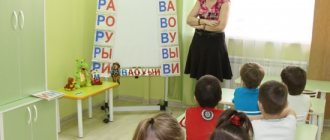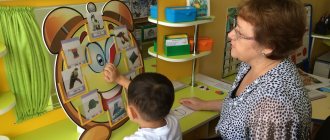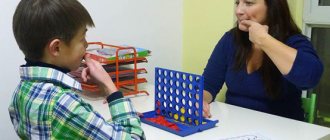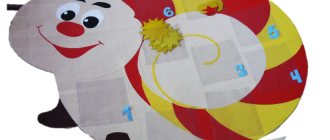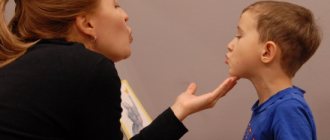In the article we will look at how the commission to the speech therapy garden goes.
If children need a special educational program, they are given a referral for examination at the PMPK. Psychologists, doctors and teachers who specialize in teaching from early preschool to high school age study the educational needs of the child.
Special garden
Many parents want to place their child in speech therapy groups, which are available in combined kindergartens, or directly in a special kindergarten with such a focus. Many people know that preparation for school and educational programs in these groups are much better and higher than in ordinary ones. In addition, it provides for a certain number of children, from ten to fourteen, no more. Thanks to this, each child will receive more individual attention. It is not very easy to get into such a group if the children do not have any speech disorders.
How to get into a speech therapy group?
- Speech therapist.No
- Questions and answers
- How to get into a speech therapy group?
What is a speech therapy group?
Some parents have the mistaken opinion that a “speech therapy group” is a group for the development of children with mental retardation and mentally retarded children.
In fact, children with the following diagnoses are accepted into the speech therapy group:
- Delayed speech development (SDD)
- General speech underdevelopment (1st level of speech development)
- General speech underdevelopment (2nd level of speech development)
- General speech underdevelopment (3rd level of speech development)
- Stuttering
Children with speech pathology must preserve their hearing and intelligence!
In speech therapy groups, they introduce sounds that were not there and correct incorrectly pronounced ones (correction of speech defects), enrich the vocabulary, develop phonemic awareness, coherent speech, and teach correct grammatical formatting. In the senior and preparatory groups they prepare for learning to read and write.
But in any case, a speech therapy group in our time is not a punishment, but rather a reward, because getting there has become more difficult, and general speech underdevelopment is easier to correct in the garden, where all the work is aimed at eliminating this problem.
In a speech therapy group, the preparation of children, no offense to anyone, is sometimes much stronger than in mass kindergartens. There are fewer children (12 people), more speech classes.
What do you need to do to get into a speech therapy group?
The recruitment of preschool institutions for children with speech impairments is carried out by the district psychological-medical-pedagogical commission (PMPC) .
To place a child in a speech therapy group in a specialized kindergarten.
Step 1 Go to a speech therapist at the local clinic. The speech therapist examines the child and gives characteristics for the district PMPK. Step 2 Find the address of your district PMPK, call and make an appointment. Clarify the list of documents required for the commission. 3rd step On the appointed day, come to the commission (PMPC) with your child for examination, have the necessary documents with you. The commission’s task is to determine whether the child really lags behind his peers in speech development or whether the parents are simply playing it safe.
Conclusion of the PMPK: “adapted general education program for preschool children with severe speech impairments”
Hello. We have the following situation: a 6-year-old child attends a preparatory group. The speech therapist at the children's clinic gave us a certificate stating that the child needs to attend a speech therapy group (diagnosis: “erased dysarthria, defect in the sounds Ш; Ж; Л; Р; Р”). The PMPK made a diagnosis: “dysarthria, erased form, FFN” and gave recommendations: “classes in an adapted general education program of preschool education for children with severe speech impairments.” Does a child have the right to attend a speech therapy group? What to do if the speech therapist refuses?
A child can attend a speech therapy group if there is a conclusion from the PMPC: “an adapted general education program for preschool children with severe speech impairments” (the PMPC does not write a diagnosis, only recommendations). If there is such a conclusion, the speech therapist does not have the right to refuse (in case of refusal, you can contact the administration).
See the answers to other questions about the speech therapy group: Which document states the rules for admission to speech therapy groups and, accordingly, age?, The PMPK certificate states that classes with a speech therapist are required. Is there a chance to get into the logo group? Is it possible to pass the PMPC on your own and provide a conclusion to the kindergarten for enrollment in the logo group?
Who makes recommendations?
Most often, recommendations to undergo a speech therapy commission are given either by a doctor from the kindergarten where the child goes, or by a specialist from the speech kindergarten when the local one is absent. Children who have speech impairments and need correction are put on a list, which is then introduced to their parents. If they agree to be transferred to a special speech therapy group, then they should appear for an interview. There a two-sided form is given, that is, a referral for a preliminary medical examination before the commission. No one will force parents to go to doctors; such a decision is purely voluntary.
Description of the psychological, medical and pedagogical commission
PMPK is an abbreviation that stands for: psychological-medical-pedagogical commission (consilium, consultation). Her work is carried out to determine the mental and physical level of development of children in order to select the most suitable educational route.
When a child needs a special educational program, he is sent for examination to the PMPK. Psychologists, doctors and teachers who specialize in teaching children from early preschool to high school age participate in the study of the educational needs of children.
The speech therapy commission meets in one room. All specialists can sit at separate tables (the child takes turns talking to them) or together. They ask the child interesting questions and offer to do some tasks.
By examining the results of tasks and conversations, psychologists and teachers draw conclusions about the psychological specificity of intellectual activity, the degree of the child’s characteristics, and establish the prerequisites for the emergence of development and learning problems.
Unfortunately, children often find themselves surrounded by strange adults, in an uncomfortable environment. Members of the commission sometimes rush the child, do not take into account the specifics of temperament, do not encourage and do not give rest when completing tasks. An unfamiliar environment negatively affects preschoolers, especially if they have developmental disorders. Sometimes children become completely silent and do not show all their capabilities, and do not want to answer the commission’s questions.
What help can be provided to a child with speech therapy disorders?
If a child has any disturbances in speech development, he will need to undergo a speech therapy commission. Based on its results, it can be defined as:
- A physical center or a speech center are separate classes with a speech therapist, when a child goes to a simple group in kindergarten, but receives additional training from a speech pathologist. In this way, minor violations are corrected.
- Logogroup, or speech therapy group. There are much fewer children in it than in ordinary ones (12/25). All the kids here have speech disorders. The logogroup may be in the kindergarten that the child already attends, but if there are no places or such groups in the institution, the child will have to be transferred to another place.
- A speech therapy kindergarten in which there are different correctional groups, classified depending on the speech disorders that are subject to correction.
Speech therapy projects for preschoolers
Among all speech therapy events for preschoolers, speech therapy projects and a summer health campaign for children with speech disorders occupy special positions.
Speech therapy projects in preschool educational institutions
To more deeply and systematically improve work performance, special speech therapy projects are being developed for preschoolers. These projects are divided into categories:
- By duration of work: short-term and long-term.
- By type of activity: research, practice-oriented, creative, informational and gaming.
If there is work to be done on setting individual sounds or learning tongue twisters, then a short-term speech therapy project at a preschool educational institution is used. If there is work to be done on working on speech breathing or improving physical health, then it will be long-term, since this work must be carried out over a long time.
Each such project has a goal, objectives, expected results, the practical significance of the project, as well as its stages and implementation strategies.
The speech therapy project is developed taking into account the age of the children in the group, as well as based on the diagnostic results. Also, the speech therapy program is a project of a speech therapist teacher at a preschool educational institution, and a joint development of all teachers carrying out correctional work in the institution. But its main compiler is a speech therapist.
Note! Speech therapy paths are often used in correctional work. This is a technique that allows you to develop several areas: speech breathing, articulatory motor skills, and coherent speech. The student must follow each path from beginning to end.
Speech development in the younger group - norms for children's speech development by spring
What is a speech therapy camp for children?
A speech therapy camp is a health program for children that operates in the summer and provides activities for the correction and development of speech. Typically, such a camp employs a teacher, educational psychologist, speech therapist, physical education instructor, and sometimes an art teacher and theater teacher. The entire program is aimed at a comprehensive approach to the correction of speech disorders: starting with articulatory gymnastics and games for the perception of sounds, and ending with special nutrition.
Speech therapy camp for children with speech disorders
A speech therapy camp for children with speech disorders operates on the basis of a preschool educational institution or as an independent organization. The main purpose of such organization of time is to provide assistance to preschool children with speech disorders.
Such work in the summer shows the greatest effectiveness, since in addition to corrective classes with children, therapeutic exercise and self-massage are carried out for general muscle strengthening, healthy nutrition and long walks in the fresh air are organized. Usually, in a camp, all shifts have their own themes and classes are held in a playful, developmental form, therefore they find the greatest response from children and their legal representatives.
Note! Leisure activities are also organized for children, which help develop creative and physical abilities: visiting the swimming pool, theaters, and city festivals. In addition, to monitor effectiveness, speech therapy examinations of preschool children are carried out at the beginning and end of the shift.
Composition of the commission
The speech therapy commission consists of the following members:
- the chairman is a specialist in the educational field;
- deputy – healthcare specialist;
- doctors of one or another specialization (ophthalmologist, orthopedist, pediatrician, otolaryngologist, etc.);
- psychologist;
- special teacher (oligophrenopedagogist, teacher of the deaf, speech therapist, defectologist, etc.);
- lawyer;
- social teacher, social worker.
To prevent the child from being frightened by unfamiliar surroundings and people, the commission may include temporary members - his class teacher, teacher, etc. Children are sent to PMPK only when their parents give consent.
List of doctors
If the parents agree to see doctors, then the child needs to visit such specialists as: otolaryngologist, ophthalmologist, pediatrician, psychiatrist, orthodontist, neurologist. Some kindergartens additionally require an examination by a surgeon.
It is necessary to ensure that the doctors of the children's speech therapy commission put their seals and signatures in the referral; all formalities must be completed. The referral is issued in advance in order to have time to go through all the specialists before the meeting of the psychological, medical and pedagogical commission takes place.
What exactly needs to be done to get into a speech therapy garden?
The staffing of preschool educational institutions today is determined by Order of the Ministry of Education and Science of Russia dated April 8, 2014 No. 293 “On approval of the Procedure for admission to training in educational programs of preschool education.”
So, how to place a child in a speech therapy group in a kindergarten.
Step 1. Get in line for a place in kindergarten - this can be done through the State Services portal (electronic) or on the official website of the mayor of Moscow.
Step 2. Receive a referral from the district clinic to undergo a PMPK (psychological-medical-pedagogical commission). To do this, you will need to visit a pediatrician, neurologist and speech therapist.
Step 3. Collect the necessary documents for the PMPC (check the exact list at the PMPC at your place of residence).
Step 4. Make an appointment at the district PMPC - this can also be done through the State Services portal.
Step 5. On the appointed day, come for the examination with your child.
Required documents
What documents will the commission require for a speech therapy kindergarten?
In addition to the direction in which the doctors are being trained, you will also need:
- a copy of the patient's birth certificate;
- application for transfer of a child to a speech therapy group;
- characteristics written by a speech therapist and teacher.
They are notified in advance about where and on what day the commission meeting will take place. This usually happens either in RONO or directly in kindergarten. Specialists will talk with the child and check the testimony and documents. In different cities, the composition of the commission may differ, but in most cases it consists of a speech therapist, a speech pathologist, a psychologist and representatives of the Regional Educational Institution.
Article:
How do you get into speech therapy kindergarten? Should I get in line again? Should I just get a referral from a speech therapist, or go through a special commission? There is an opinion that a speech therapy garden is a certain “stigma” in a child’s personal file. Is it really? First, let's figure out what a speech therapy group is? Correctional groups are divided into speech (speech therapy) and groups of children with mental retardation (delayed psycho-speech development). In speech therapy groups, they introduce sounds that were not there and correct incorrectly pronounced ones (correction of speech defects), enrich the vocabulary, develop phonemic awareness, coherent speech, and teach correct grammatical formatting. In the senior and preparatory groups they prepare for learning to read and write. In the ZPR groups there are both a speech therapist and a defectologist (in addition to teachers who have the necessary qualifications). Every year for different ages is a multifaceted work. There are kindergartens where all groups are speech. There are - where there are only groups with mental retardation. There are gardens where speech (speech therapy) groups + groups with mental retardation + ordinary groups = a combined type garden. There is an ordinary garden where there is a logo station. ONLY children with IMPAIRED PRONUNCIATION are enrolled in the speech center. But, in any case, a speech therapy group in our time is not a punishment, but most likely a reward, because it has become more difficult to get there, and the general underdevelopment of speech is easier to correct in the garden, where all the work is aimed at eliminating this problem. Perhaps it is no longer a secret to anyone that in speech therapy kindergartens the preparation of children, no offense to anyone, is sometimes much stronger than in mass kindergartens. Because children from a speech therapy kindergarten come to school with a much better vocabulary than children from a regular kindergarten. They know more, they have a wider vocabulary, many skills are better formed, starting with graphic skills, sound-letter analysis and ending with stories based on pictures, generalizing concepts are better formed. That is, children come from speech therapy kindergartens even more prepared. Some parents are very attracted by all this splendor, and they dream of enrolling their children in a speech kindergarten. Others are afraid of speech therapy kindergartens, believing that a child who finds himself among poorly speaking peers will begin to speak even worse than before. These are misconceptions. A child with speech therapy problems does not begin to speak worse because he communicates with other children with similar disorders. The only exceptions are those cases when a child with pronunciation problems ends up in a group of children who stutter. Indeed, there are cases where a child develops stuttering “by imitation.” But specialists, as a rule, avoid such mistakes. So, for one reason or another, you think that your child definitely needs a specialized speech therapy kindergarten. What do you need to do to get into a speech therapy garden? The speech therapy kindergarten accepts children mainly 4-5 years of age, since correction of speech disorders is especially important for them in order to successfully prepare for school. From the age of 3 you can join a group for children with delayed psycho-speech development (DSD). It will be very good if you, dear parents, have already visited several educational institutions. You will talk with the head/director about the availability of free places, perhaps visit the advisory center at the institution, where you will meet specialists. The district Psychological, Medical and Pedagogical Commission staffs preschool institutions for children with speech impairments. Addresses and telephone numbers of district PMPCs in Moscow can be found here. What specifically needs to be done: From October 1, 2010, the procedure for recruiting preschool educational institutions has changed. Now the procedure for enrolling in a preschool educational institution is established by order of the Moscow Department of Education dated August 31, 2010 No. 1310 “On approval of the Procedure for recruiting state educational institutions that implement the basic general education program of preschool education, the system of the Moscow Department of Education.” How to enroll a child in a speech therapy kindergarten Step 1. In order for a child to be sent to a kindergarten for children with mental retardation, it is necessary that he be registered in the Unified Electronic Register of the Automated Information System “Employment of Preschool Educational Institutions”. Parents are given the opportunity to independently register their child in this Unified Electronic Register on the website ec.mosedu.ru. You will be able to independently track the progress of your child’s order in the Electronic Register of Future Pupils. Step 2. Go to a speech therapist at the local clinic. The speech therapist examines the child, gives a referral to undergo a PMPK (psychological-medical-pedagogical commission) Step 3. Collect several certificates for the PMPK: - from an ENT doctor, - an ophthalmologist, - a pediatrician, - a neurologist (for children under 3 years old), - a psychiatrist . Step 4. Find the address of your district PMPK, call and make an appointment. Step 5. On the appointed day, come for the examination with your child. What you need to take: Documents for passing PMPC Necessary documents for speech therapy kindergarten: Child’s birth certificate; Passport of the parent or person replacing him (for temporary residents of Moscow and registration certificate); Four medical reports: - a child psychiatrist from the primary care hospital at the child’s place of registration (for children under 3 years of age - a neurologist at a district children’s clinic), - a speech therapist at a district children’s clinic, - an otolaryngologist at a district children’s clinic, - an ophthalmologist at a district children’s clinic. If the child previously attended a kindergarten, it is necessary to additionally provide a psychological and pedagogical characteristics from this kindergarten. If the child has previously passed a commission in another city or district primary medical education center, it is necessary to additionally provide a psychological, medical, and pedagogical opinion from this commission. Your child will be examined by the following specialists: - speech therapist, - psychologist, - sometimes a neuropsychiatrist. The commission’s task is to determine whether the child really lags behind his peers in speech development or whether the parents are simply playing it safe. Or maybe they definitely want to enroll the child in a speech therapy group, despite excellent speech and development according to age? It happens! If the commission decides that the child has problems, then the question arises: which speech therapy kindergarten should the child be sent to? After all, diagnoses are different, and depending on them, a group of children of a certain age is recruited. For example, if a 4-year-old child is diagnosed with “general speech underdevelopment (GSD) of level 1-2,” then the senior speech therapist looks at which kindergarten is enrolling 4-year-olds with this diagnosis this year. And if a 6-year-old child has problems with sound pronunciation (hissing and whistling sounds are distorted, the baby does not pronounce “r” and “l”), then such a child will be sent to another group - a preparatory group, where the program is different and the requirements for learning outcomes are higher . For children who stutter, there are generally separate kindergartens with their own program and a set of specialists (for example, art therapy classes are held there). At the commission, the child is assigned to one of the following groups: - stuttering; - general speech underdevelopment (children with delayed speech development or severe lexical and grammatical speech disorders are sent here); - phonetic-phonemic speech disorders (simply put, these are pronunciation disorders - cases when a child pronounces 10 - 12 sounds incorrectly); - violations of the pronunciation of individual sounds (2 - 3 sounds). So, your child will be examined and given a certificate of completion of the PMPC. Only after the commission can parents breathe easy: on September 1, the baby will definitely go to kindergarten. In addition to gardens that are completely devoted to speech therapy needs, speech therapy centers are widespread in ordinary kindergartens.
Walkthrough
Most often they ask questions about logical thinking and intelligence. The child must repeat combinations of sounds to identify violations in the pronunciation of certain sounds. Feedback from parents shows that the conversation does not last long, 10-15 minutes, and the result is announced immediately.
Representatives may also ask:
- insert a figure into an identical figure (triangle into a triangle, circle into a circle, etc.);
- assemble a pyramid;
- name colors and shapes;
- collect body parts of a paper man;
- name all the seasons and the one that is now;
- find an extra item;
- answer the question of who the baby is to dad, grandma, etc.;
- answer spatial questions (where is the dog sitting?);
- describe what is shown in the picture;
- combine objects into groups according to a certain characteristic;
- say words like mezzanine, stir, etc. to check audio pronunciation;
- draw something;
- sing an excerpt from a song or recite a poem.
It is not advisable to prepare a child in advance for a commission to a speech therapy group, since the correctness of measures to eliminate violations depends on the accuracy of the diagnosis. There is no need to be afraid of any terrible diagnoses; for a speech therapy group, the following conclusions are essentially appropriate: general speech underdevelopment; phonetic-phonemic underdevelopment of speech; stuttering, or logoneurosis.
It is recommended not to refuse a speech therapy group, especially if there are speech disorders. Children then learn writing, counting, reading, and correct pronunciation of sounds. In addition, this is very profitable, since the cost of classes with a private speech therapist is from 500 rubles, but in the kindergarten they are free, homework is given.
The waiting list for a speech therapy commission in Moscow is approximately 1.5 months.
Speech therapy garden: why is it needed and how to get into it
Is a speech therapy garden or group a stigma in a child’s personal file? Many parents are scared when they receive a referral from a speech therapist and a PMPK conclusion. Others, on the contrary, try in every possible way to place the child in a speech therapy group, even if no speech abnormalities are noticed in the child. What is the peculiarity of a speech therapy garden (group) and how you can get into it, as well as what dangers this poses to your baby, let’s figure it out together.
You can often hear parents wondering why specialists and educators are so concerned that a three-year-old child is silent. A number of parents and “knowledgeable” grandmothers consider the lack of active speech in a 3-4 year old child to be a fact that does not deserve special attention, explaining this by the fact that their baby is simply “Silent.” “Now he will accumulate a vocabulary, grow up, and then he will speak in complex sentences,” mothers and grandmothers say. To think so is fundamentally wrong, if only because speech problems negatively affect the intellectual development of the child as a whole, and also leads to behavioral problems due to the inability to express one’s needs and desires. That is why, if a child is silent by the age of 3-4 years, it is important to contact a speech therapist in time.
What is a speech therapy group?
Speech therapy group
- this is a special group in preschool educational institutions that pays increased attention to the problems of speech disorders in children 3-6 years old. At the same time, they can be divided into 2 subgroups: a purely speech therapy (speech) group, in which children learn to pronounce sounds correctly and actively develop speech, and a mental retardation group, in which children with delayed psycho-speech development are trained. Here a defectologist gets involved in working with children.
Classes held in speech therapy groups are held in a more intensive mode, there are two or three times more of them, as a result, the child is better prepared for school than children from regular groups.
Some parents state: “I don’t want my child to be sent to a speech therapy kindergarten, because he will communicate with mentally retarded children.”
So, children with mental retardation are not accepted into the speech therapy group (kindergarten).
Therefore, parents should not be afraid, but on the contrary, be glad that their child was enrolled in a speech therapy kindergarten or group, because it is very difficult to get there.
Age-related features of children's speech development:
- The age of up to three years is a very sensitive period for speech development. The baby absorbs everything he hears like a sponge and easily remembers words. That is why, at such an early age, children are able to master several languages, without special study or trouble.
- From three years of age and older, this sensitive period ends and the child has to actively study and purposefully learn the language.
So, what should parents of three-year-old children be wary of:
- The child understands the speech of others, but does not speak himself.
- It happens the other way around, when the child speaks himself, but cannot understand someone else’s speech.
- The baby does not speak himself, and also does not understand the speech of others.
- The baby makes many sounds incorrectly.
If the medical-pedagogical commission has given you a referral to a speech therapy group (kindergarten), treat this with due understanding.
Classes in a speech therapy group (kindergarten) are not a punishment, but rather luck; getting there is quite difficult, and it is easier to correct speech disorders in a child in a kindergarten group, where all the work of specialists is aimed at eliminating this problem.
It happens that a mother, knowing all the advantages of a speech therapy group (kindergarten), in every possible way wants to place her child there. This is not so easy to do; the number of places in such gardens (groups) is limited.
How to get to a speech therapy garden (group)
If your kindergarten already has a speech therapy group, then after examining the child by a speech therapist, if any speech disorders are identified, the specialist will give you a referral to a speech therapy group. All you need is your consent to the transfer.
If the child is still small and is just about to go to kindergarten, then first of all you need to visit a speech therapist at the children's clinic. Having detected deviations, the specialist will give a referral to the PMPC commission. Next, you sign up for PMPC. Before the commission, you must first go through the following specialists: an ophthalmologist, an otolaryngologist, a neurologist, a psychiatrist (if indicated), and a pediatrician. With the conclusions of specialists, a birth certificate and a passport, you appear at the PMPC commission on the appointed day.
The task of the commission, which includes a speech therapist and a psychologist, is to find out whether the child really lags behind his peers in speech development, or whether the mother is simply playing it safe. The commission decides whether to send the child to a speech therapy group (kindergarten) and in which group (kindergarten) he will attend. This depends on the characteristics of the speech disorder: stuttering, general underdevelopment of speech, speech disorder of a phonetic-phonemic nature, violation of the pronunciation of individual sounds.
At the end, the commission issues a certificate of completion.
If the commission decides that the baby does not have any speech disorders and recommends you a regular kindergarten, accept this with understanding. After all, there are few speech therapy groups and kindergartens in the city, and perhaps some child really needs the help of a specialist. Don't try to take someone else's place.
Features of speech therapy gardens (groups):
An important advantage of the speech therapy group is the fact that the number of people is only 10-15 people.
The speech therapist conducts general developmental classes with children every day, and group (based on general diagnosis) and individual classes several times a week.
The group recruits children of the same age with the same speech impairments. Children learn to speak coherently through play and accumulate vocabulary.
They work individually with children with problems with pronunciation of sounds.
In classes, the speech therapist and teacher, in addition to sound production and enriching vocabulary, pay great attention to the development of the grammatical side of speech, as well as the development of logic, attention and memory, imagination and thinking. After such speech therapy groups (kindergartens), children leave better prepared for school.
The speech therapist is required to give homework, which needs to be given special attention. It is very important that parents do not abdicate their responsibility and, in addition to classes with a speech therapist, work with their children at home. Such joint work between a speech therapist and parents will lead to a lasting positive result.
Conclusion
It is very important that by the age of 6-7 the child has developed free, understandable speech; this will help him achieve positive results in his studies during his school years and feel comfortable in the children's team. Return to section
